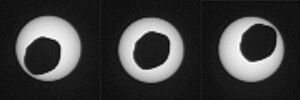Solar eclipses on Mars facts for kids

Mars has two small moons, named Phobos and Deimos. These moons are much smaller than Earth's Moon. Because they are so tiny, they create very different kinds of solar eclipses on Mars compared to what we see on Earth.
Eclipses on Mars
When a moon passes in front of the Sun, it causes an eclipse. On Mars, the two moons create unique eclipse events.
Phobos: Quick Eclipses
Phobos is the larger of Mars' two moons, but it's still quite small. It measures about 20 by 25 kilometers (12 by 16 miles). Phobos orbits Mars very quickly. If you were standing on Mars, an eclipse caused by Phobos would last for only about 30 seconds!
Phobos also orbits Mars much faster than Mars spins. It takes only 7 hours and 39 minutes for Phobos to go around Mars once. A day on Mars is 24 hours and 37 minutes long. This means Phobos can cause two eclipses in a single Martian day!
Deimos: Just a Dot
Deimos is even smaller than Phobos. It's only about 15 by 10 kilometers (9.3 by 6.2 miles) across. Because Deimos is so tiny, it cannot block out the Sun enough to cause a real eclipse. If you watched Deimos pass in front of the Sun from Mars, it would just look like a small dark dot moving across the Sun's bright face.
Watching from Earth
Both Phobos and Deimos are too small to cast a shadow on Mars that we can easily see from Earth with telescopes. However, since we've sent spacecraft to orbit Mars, we have been able to see the shadow of Phobos on the Martian surface. These amazing pictures help us learn more about Mars and its moons.


